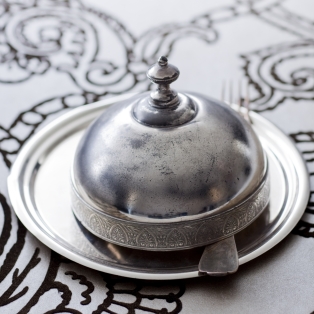News
The art of complaining
Friday, February 25th, 2011
We all love eating out, especially when the food is perfect, the service top-notch and the ambience warm and welcoming. Unfortunately even the most reputable restaurants, have their ups and downs (they’re run by humans, after all) and sometimes things go wrong. Whether your medium steak could have been saved by a good vet or your waiter wasn’t as attentive as you would have liked, a negative experience can leave you with a sour taste in your mouth. It’s your right to complain if you feel that what you have paid for was not up to scratch, and complain you should. When it comes to eating out, the unwritten law of the restaurant industry is that the customer is always right. Regrettably sometimes patrons use this to justify rude and aggressive behaviour. So what’s the best way to go about lodging a complaint? We asked some prominent industry personalities for help in answering this rather sensitive issue.
How should you complain?
Author of the blog Relax with Dax and seasoned restaurant goer, Dax Villanueva emphasises that the purpose of a complaint should be to remedy the situation. “Most restaurant owners or managers would prefer the opportunity to fix any problems as and when they arise,” says Dax. “For me, how a restaurant handles complaints is more important than whether something went wrong or not. When things go wrong, because they always will at some point, handling the complaint appropriately is what sets a good restaurant apart.”
Neil Grant of Eat Out Restaurant of the Year winner Rust en Vrede believes that complaints should be lodged and dealt with as soon as a problem arises. “To be fair, we are human and we make mistakes,” comments Neil, “but, if we don’t know about them until it is too late, then there is little we can do to rectify the situation. You can call the next day and apologise, but, if you bring it to our attention immediately, the issue can be sorted out straight away.”
Merizle Mitrovich, the head of faculty at the Institute of Culinary Arts, agrees with Neil. “From a kitchen point of view, we prefer customers to let front of house know immediately if there is any kind of problem,” says Merizle. “This allows us to sort it out immediately. Due to the fact that the customer left it for the next day, there is a big possibility that the customer will never return to the restaurant and miss out on many memorable meals due to one small mistake.”
Werner Wentzel, the food and beverages manager at Eat Out Top 10 finalist Zachary’s, explains that restaurants are really in the business of giving all their guests a pleasurable experience. “The sooner a guest complains or gives constructive criticism,” says Werner, “the sooner the restaurant is able to save the situation and, in many instances, turn a bad situation around into a happy one. Most restaurants will do everything in their power to rectify a reasonable complaint.”
Marlene van der Westhuizen, well-known chef and author, has eaten in many of the world’s top restaurants. “All complaints are valid, but should be put forward with elegance and good manners,” advises Marlene. “Be clear and stick to facts. Try not to be personal.”
Complaining online
“Complaining after the fact, by phoning the next day or, even worse, on blogs or website makes it almost impossible for the restaurant to salvage the situation,” says Werner. Marlene agrees, adding “This could be a problem, because the clients are not always fair or knowledgeable enough. In addition, the restaurant owner cannot defend his/her establishment.”
“If you feel that you don’t want to complain, because you don’t want to make people feel uncomfortable at the table, then that is your choice but it is not fair to then go and complain online afterwards,” explains Dax. “In general, online commentary should be saved for feedback, as complaints should be resolved at the restaurant. Readers appreciate feedback and one of the things you can provide feedback on is how well your complaint was handled.”
“The problem is that if a guest is upset during the evening, I believe he has already made up his mind about writing a review,” says Neil. “I don’t believe this is fair, as we have not been given a chance to fix anything in that case. Often, in other industries, you would escalate the issue to a manager before publishing it on a site but, for some reason, this does not apply in the restaurant industry. If a diner has complained while dining and nothing has been done about it, however, then I agree that the diner should go ahead and write a review. There are also those who state very valid points in a review and we, as restaurants, can learn from these reviews and improve.”
“The sincerity of website review writers must also be looked at,” adds Merizle. “It is known that certain restaurants ask people to write favourable comments on websites and, in much the same way, some restaurants may be targeted by means of online complaints. For this reason, it is important that any comment, via any form of media, be reacted to immediately from the establishment’s side. Unfortunately, this is often impossible on the internet.”
Owner of Freedom Café, Neil Roake doesn’t beat about the bush when discussing complaints and how they should be handled. “Constructive criticism is a valuable tool for restaurateurs to adjust and improve the restaurant experience,” says Neil, “but I would far rather have guests tell me immediately if something is unsatisfactory, at the time of the incident, then have them go off and tell a group of friends how bad their experience was.”
Have some meaningful praise or feedback that you’d like to give to a restaurant? Why not write a review?








